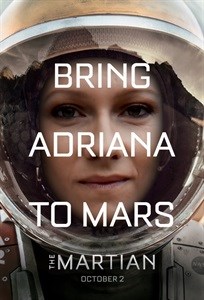
#YouthMonth: Adriana Marais on moving to Mars
We interviewed Marais to find out why she's so keen to take on this mission, and what she hopes to achieve for future generations.

Who is Adriana Marais and why does she want to take a one-way trip to Mars?
I went to school in Pietermaritzburg, and studied theoretical physics and philosophy at the University of Cape Town. I completed my MSc summa cum laude in quantum cryptography at the University of KwaZulu-Natal (UKZN), and was awarded my PhD in quantum biology at the same institute this year. I am a member of the Quantum Research Group established by Prof. Francesco Petruccione at UKZN, and plan to continue doing research in quantum biology, specifically studying quantum effects in photosynthesis, as well as the origins of prebiotic molecules and life itself.
I am a theoretical physicist and a problem solver. I have applied my knowledge of physics to areas as diverse as information security, photosynthesis, and the origins of life. I spend my days thinking about fundamental questions about the world around me. As a researcher, being one of the first human minds to experience living in a totally new world would be a dream come true. The possibility of contributing to the discovery of evidence of life on Mars would get me out of bed each morning.
I think I must be a kind of extremophile, thriving in physically and mentally challenging situations, and in this sense moving to Mars would be an ideal opportunity!
What prompted you to dive into physics - has it been as rewarding as you'd hoped it would be?
If you have ever had questions about why reality is the way that it is, physics is the body of knowledge that tries to answer these questions on a fundamental level.
To become a physicist, you should love to learn and love to solve problems. Everything is possible when you love what you do, and as long as you are curious, there will always be so many things about the world around you to be discovered.
I studied physics initially because of thoughts of becoming an astronaut, but soon became interested in quantum mechanics. I remember a conversation with a lecturer during my undergraduate studies at UCT about the impossibility of observing something without interacting with it, and therefore disturbing it in some way.
The implication that the observer is then inextricably part of the system under observation has fascinated me ever since. I was intrigued by the realisation that the way a question is posed can influence the answer, from the level of human interaction all the way down to measurements performed on single particles.
I realised the unique contribution that a creative human mind can have in shaping the direction of scientific discovery and decided to continue studying theoretical physics.
After travelling for two years, I really missed physics, even trying to learn Japanese was not a replacement for the kind of challenge that trying to understand reality mathematically presents. I decided to start researching photosynthesis on a quantum level after a guest speaker gave a seminar in our department.
In the meantime, my research interests have led me via the field of my PhD, quantum biology, to the famous question, "What is life?". In my opinion, if life can exist on Earth, in an unimaginably large universe, it must also exist or have existed elsewhere. The study of living systems on Earth, and the mystery of the emergence thereof, is always going to be severely limited by a lack of precise knowledge of the conditions under which it emerged, in a possibly singular event.
Billions of years of evolution of life on Earth have culminated in the possibility of us calling another planet home for the very first time. Untold discoveries lie in wait, including the possiblity of finding evidence of life forms different to the ones we know of here on Earth. I applied to go and live on Mars because I would be prepared to sacrifice a lot for this idea, this adventure, this achievement, that would not be my own, but that of all humanity. Even not returning to Earth.
My advice to aspiring physicists is to study hard, read-read-read, never stop asking questions, and be joyful that you are taking part in the pursuit of knowledge as your life’s work.
By travelling to Mars, what do you hope to achieve for future generations?
In order to tackle and survive the global issues that we are currently facing as a species, I believe that we need to revive in ourselves a sense of being proudly human. We observe, we dream and we expand our horizons through the realisation of these dreams. I want to make the best contribution of which I am capable to this grand and improbable era of human information creation. I want to be one of the first conscious minds to know what it is like to live in a totally new world. I want to add to the sum of human knowledge by contributing to the establishment, and possibly the discovery of evidence of, life on Mars.
I believe that expanding off of Earth is necessary for the long-term survival of our species. But also that surviving the relatively hostile environment on Mars will lead to new technologies that will help us on Earth - to tackle climate change, poor resource management and the poverty in which so many of us live. Life on Mars will be a precious and fragile resource, and I believe that an attitude of deep appreciation for life and all that is needed to sustain it will characterise morality on Mars. And also, I hope, influence the way people think on Earth.
Young or old, who inspires you?
We cannot underestimate the power of inspiration. There was an explosion of students who studied science and engineering after watching the Moon landing, whose training and innovation contributed to the subsequent development of the personal computer and the internet, one of our proudest moments as humans in my opinion.
I think that different people embody the voice of wisdom at different times in one’s life, the challenge is to take good advice when it is given. There are many people, including family and friends, as well as teachers and mentors I have had through the years, to whom I am grateful for inspiring, encouraging, and especially challenging me.
A favourite quote of mine is from a legend with whom we are privileged to have shared an era - Nelson Mandela: “It always seems impossible until it’s done.”

Once you arrive on Mars, what message would you want to send to the youth of Earth who would like to walk in your space boots?
Don’t let anyone tell you you can’t do it. We are born dreamers and our big ideas are what makes us proudly human.
The people who are crazy enough to think they can change the world are the ones who do. - Steve Jobs
As a young South African, what, in your opinion, is the significance of Youth Month in 2016?
We are living in a unique point in the history of life on Earth. Each of us seven billion humans need to think very carefully about how we will contribute to society and justify our use of resources on this planet. We have reached the point where our activities are having an effect on the Earth on a global scale, and food, clean water and fresh air are fast becoming luxuries to which not all of us have access. In order to sustain our existence on this planet and perhaps others, we need to make an effort to see the bigger picture, and think carefully about how we can contribute to the solution of the many problems and global issues that exist today.
I believe the youth see this, they have been born into this reality and have the talent and imagination to make the world a better place. Celebrating the youth, and the South African youth, is an important investment in tomorrow.
For more info on Adriana Marais' journey to Mars, go to www.adrianamarais.org/mars-one.
Mars One is a not-for-profit foundation with the goal of establishing a permanent human settlement on Mars. To prepare for this settlement the first unmanned mission is scheduled to depart in 2020. Crews will depart for their one-way journey to Mars starting in 2026; subsequent crews will depart every 26 months after the initial crew has left for Mars. For more info, go to www.mars-one.com.

About Sindy Peters
Sindy Peters (@sindy_hullaba_lou) is a group editor at Bizcommunity.com on the Construction & Engineering, Energy & Mining, and Property portals. She can be reached at moc.ytinummoczib@ydnis.Related
Public Sector Leaders celebrates Women's Month 16 Aug 2023








